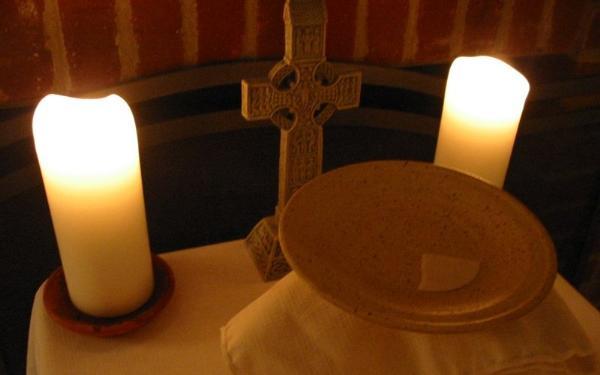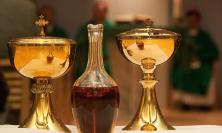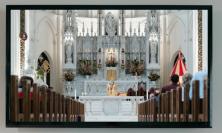How can our experience of the eucharist, during the liturgy and in our everyday lives, influence our interactions with people of other faiths? As we celebrate the feast of Corpus Christi, Michael Barnes SJ suggests that, in remembering the brokenness of Christ in our celebration of the eucharist, we bring our own ‘eucharistic moments’ before God, and our own broken relationships are healed.
Anyone who has had much experience of inter-religious dialogue knows that there is something deeply significant about the giving and receiving of food and drink. Serious encounters with people of faith often involve simple meals. What makes the sharing of food and drink so important is that it evokes the life-giving centre of Christian faith: the story of the Last Supper and the eucharist which gathers the community of believers. However interpreted – and Christians can, of course, differ quite profoundly in their eucharistic theology – all will agree that in the breaking of the bread the past is remembered, its meaning made present, its future fullness anticipated. When that recent past includes meals with others, these memories – I like to call them 'eucharistic moments' – are also recalled. In some mysterious way the hospitality shown by Sikhs and Muslims becomes part of Christian prayer, that process of recollection and self-offering which is formed and expressed in the liturgy of the eucharist.
Church and eucharist – memory and promise
The point of this article, however, is not to suggest some covert way in which 'others' can be neatly subsumed into the all-encompassing Christian ritual. The Church is, in principle, the whole of humankind redeemed in Christ; at the same time the Church is this community of faith, looking forward like all peoples to the time of its fulfilment. How to hold these two truths together? The eucharist, and the sacraments generally, are the source of the Church's constant renewal, not just reminders of God's promise to remain with God's people but the means by which those promises are to be realised. The eucharist – to use that familiar patristic saying – 'makes the Church'.[1] This does not mean that the eucharist is some sort of triumphant ritual of the redeemed. Far from it. The eucharist makes the Church as a people who hold open the possibility of redemption for all people. How does the eucharist enable us, then, to reach back into the past, to re-imagine our roots in relationship with others, and forward, to restructure a future of co-operation? As a sacrament of salvation the eucharist is a genuinely effective sign of God's salvific work in the world. How, then, do we celebrate the eucharist in such a way that we are reminded of our evangelical responsibility, yet recognise that the relationships which we form are always broken and in need of constant healing?
Flashes of recognition
Let us begin with that familiar story of the two disciples journeying to Emmaus and with the mysterious way in which God is announced. Luke tells us that they did not recognise the Lord until the breaking of bread; then there comes a moment of insight, as they understand what he has been saying to them. It makes them realise why their 'hearts burned within'. At that point, we are told, the Lord vanished from their sight. It is almost as if all we can ever bear is that occasional glimpse of the truth, the overwhelming brightness of the sun glimpsed round the edges of the clouds. That, of course, is not the end of Luke's story. The disciples return in haste to Jerusalem to spread the news of what they have seen – only to find that the Lord has appeared there as well. This 'eucharistic moment' is not just a flash of recognition which enables the disciples to find a pattern or sense of meaning in their memories and their experience, but a movement of the Spirit which forms a shattered group of followers into a community of faith and sends them out to greet each other with the Good News of what they have learned.
This is how the eucharist 'makes the 'Church'. To put it at its simplest: the eucharist tells a story, our story. The Last Supper is the heart of a narrative which, on the one hand, links past and present by looking back to the passover and the covenant, and, on the other, orientates the present towards the future by looking forward to the coming of the kingdom.[2] It is this attempt to span the reaches of time which makes the eucharist more than a ritualised repetition of what happened, a retelling of the story. In eucharistic celebration the same ordinary objects and the same everyday gestures recorded in the gospel story are used to bring home as graphically as possible the immediacy of Jesus' action. As such they fulfil the purpose of all ritual: the continual rerooting of a community in time and space.[3] For the Christian community the words of thanksgiving and praise which make the eucharist are the Church's response to God's prior Word of command – the Word in the words, the words of institution, 'do this in memory of me'. In this act of thankful obedience before the Word the Church finds its identity as a missionary body, 'sent out' to share the Good News of God's peace and joy. Through its celebration of the eucharist and its constant practice of acts of praise and thanksgiving the Church accepts to become what God calls it to be.
A story fraught with the ambiguities of human living
As with Luke's story, however, practice does not end there. In going out and preaching the gospel the Church finds that the Good News of the resurrection is already known elsewhere. This privileged 'eucharistic moment' always points beyond itself to something greater – a revelation which the Church does not own, let alone control. In celebrating and proclaiming God's Word the Church takes a risk. Not only may the Church encounter signs of the God who goes before, but, much more problematically, a gospel which would communicate a message of peace and reconcile and build relationships with others may lead to misunderstanding, rejection and worse. The mission fails. The community is broken. There is a constant need for healing, for return, for rebuilding, to repeat the story which forms faith and to learn again how to respond to God's imperative. When identity is under threat we return to the sources, the origins of faith, and to the patient re-presenting of the experiences which make us who we are. Moreover, we seek to incorporate into the liturgy those powerful traces which God leaves in our world. That is to say that into the formal celebration of the eucharist we bring our 'eucharistic moments' before God: not in order to resolve them intellectually, but precisely because often they cannot be resolved intellectually. They point to God; they do not explain God.
There is no doubt that there is an incredible power in this return to the story, a power which brings the healing and the wholeness which God always promises. There is also a danger, however, of a certain type of fundamentalism: that the mere repetition of the familiar words and phrases of a text can become a way of informing particular attitudes and enforcing predictable outcomes. It can be a way of locking a community safely into tradition. Can we speak of ritual in general, and the eucharist in particular, in a way which represents the very best of a tradition without, at the same time, drawing borders and frontiers against what is other?
What keeps us from treating the liturgy as if it is no more than a constant remaking of what is always in danger of being unmade by human ignorance and frailty is that something of our confusion and pain and lack of resolution is present within this formative act of Christianity itself. The story is not the record of an idyllic gathering of intimates. This, the original 'eucharistic moment', is fraught and broken with all the fault-lines and deep ambiguities which make it not just divine revelation but a supremely human episode.
The Last Supper: a meal counting the cost of death
The Last Supper sums up a whole series of face-to-face encounters between Jesus and his disciples. It is significant that very often these encounters include meals, in which argument, disagreement and even – and especially – betrayal are as central as Jesus' words of instruction and healing. The Last Supper, most importantly, is a meal taken in the face of death. However Jesus' identification with the bread and the wine is to be interpreted theologically, there is no doubting that his words, 'my body broken for you . . . my blood poured out', as repeated in the liturgy have an extraordinary power over the imagination.[4] The Last Supper is the last occasion that the disciples will meet together as a group before being scattered. And in every subsequent celebration of the eucharist the memory of that moment of betrayal of the leader and the breaking of the community is present.
The body of the Church – broken as Christ is broken
My point is this: it is the very nature of the eucharist, in enacting the drama of Christ, to incorporate an element of the brokenness of the world and the brokenness of human relations into the story of the foundational event of Christian faith precisely because it mirrors the brokenness of Christ himself. To put that another way, let me use the metaphor of the body. Augustine spoke of the Christian community becoming the body of Christ by receiving the body of Christ; when we are offered the Body of Christ in communion we reply 'Amen', meaning 'yes, we are '.[5] In the presence of the Body of Christ we become the Body of Christ. The body which is broken for us makes us a body which is also broken; in us, in our lives faithfully enacted before the face of Christ, the story is repeated. But, of course, the story is not of Christ made whole and inviolate. His life and death prepare him for resurrection certainly, but this is a resurrection precisely through misunderstanding and suffering.
It can be nothing less for those who would follow. To become the Body of Christ we also must be broken like Christ. This is a story shot through with a series of interruptions in which the unexpected, the unwanted, the traces of an otherness which threaten to upset and break us, make themselves present. If we would repeat that story by learning through the liturgy to enact its lessons in our lives then we should also remember what it cost the first time.
Learning a sensitivity to the other
What has all this got to do with people of other faiths? Just this: I am trying to develop an approach to the eucharist which allows 'eucharistic moments', a contemplative attention to the presence of God in the world of the other, to be born from the story – the drama – which forms the Church. In the eucharist we are brought into an effective relationship with God, but we also learn how to become sensitive to all those other relationships, both within the body of the Church and without, which God calls us to establish.
Elsewhere I have developed this point by a distinction between what I call a theology for dialogue and a theology of dialogue.[6] The former is, as its name implies, a defensive strategy of control; the latter begins from a different point, with a reflection on the experience of being in dialogue with the other. By this I do not mean that we reflect immediately on particular theological issues which are raised by the dialogue (for example, what as Christians we are to make of Islamic ideas about Jesus or Buddhist ideas about the nature of the self). Rather we reflect on the experience of relationality itself.
The problem is, of course, that we tend to work the other way round: with a theology for dialogue. Now I do not doubt that, at some level, some set of formed conceptualities is bound to inform our dialogue with the other. We cannot just put brackets round our beliefs. In asking for a shift of emphasis to a theology of dialogue, I want to ask a different set of questions. How and where is faith formed? How does it grow?
Instead of allowing faith to be formed by liturgy and religious practice we tend to begin with particular statements of belief which, all too often, have been developed over against what is other or different. This is not to suggest that our religious traditions are based on some form of near fundamentalism; but it is to argue that, because of a chequered history of inter-faith relations, the emphasis has often been on what differentiates one faith from another. We seek to identify ourselves in terms of particular sets of beliefs; what are in many ways typical traits, instincts and predispositions get spelled out in largely intellectualist terms as distinct from the other. This is a very human response – to seek what is distinct – and I am not saying that it can or should be entirely avoided. Rather I am saying that we have to avoid the worst aspects of an intellectualist 'placing' of the other, by learning to talk about ourselves not just in a priori theological terms but in terms which emerge from the relationships we form with others.
Mirroring the brokenness of Christ
How to bring these two together? It is not enough simply to take in and think about the words we may have shared with the other, the conversation we have had over the meal in the gurdwara, over the cup of tea and biscuit or somozas. We also have to think about the practice of faith which has made us the people we are. We need to focus on how we as Christians practise the eucharist in a world of many faiths. Do we, for instance, give as much attention to the rite of dismissal, and the responsibility we take on to go out 'in the peace and joy of Christ', as we do to the penance rite and the readings?
Let me return finally to my 'eucharistic moments', those tiny reminders of the mysterious presence of God, something familiar and understood but also different and unknown. They speak of a continuity of experience across the faiths, but they also note a discontinuity: they are same and they are other. In celebrating the eucharist with people who have been across the threshold of the local mosque or temple I have always tried to stress the importance of taking that experience seriously – in all its beauty and threatening strangeness. That means returning to the sources of faith and what we know to be true, for that is where we learn to discern the presence of the living God. In celebrating the eucharist we recognise that when Christ offers himself for the world he offers himself for all. At the same time, the inter-faith experience of crossing into the world of the other shows that we do not know everything about the ways of God. Like the disciples on the way to Emmaus we may be enlightened by those unsuspected moments when the Lord speaks in the darkness. And like them we may learn that the darkness is sometimes a good place to be, a place which mirrors the brokenness of Christ who also faced the otherness of death.
Michael Barnes SJ lectures in the Theology of Religions at Heythrop College, University of London. He is the author of Theology and the Dialogue of Religions (CUP, 2002).
Taken from an article that first appeared in The Way Supplement 94, 1999, pp. 69-77.
[1]See especially Paul McPartlan, The eucharist makes the Church: Henri de Lubac and John Zizioulas in dialogue (Edinburgh: T&T Clark, 1993).
[2]The synoptics all see the Last Supper as an anticipation of the messianic banquet, but also as the culmination of a series of meals held with disciples: Mt 26:29; Mark 14:25; Luke 22:18.
[3]See the work of Victor Turner on ritual and liminal experience, especially in The forest of symbols (Ithaca: Cornell University Press, 1967) and The ritual process (Ithaca: Cornell University Press, 1969).
[4]Not the least merit of P. J. FitzPatrick's recent study of the theology of transubstantiation is that he reminds us of the context which scholastic discussion of Aristotelian categories tends to forget: 'Whatever else the Eucharist is, it is a rite of some kind'. See In breaking of bread:the eucharist and ritual (Cambridge: Cambridge University Press, 1993), p 47.
[5]Sermon 272; PL 38: 1246-7.
[6]See especially my Religions in conversation: Christian identity and religious pluralism(London: SPCK, 1989).





